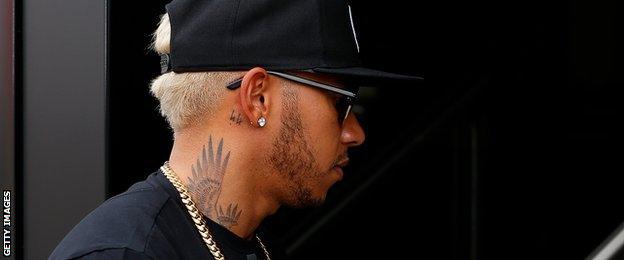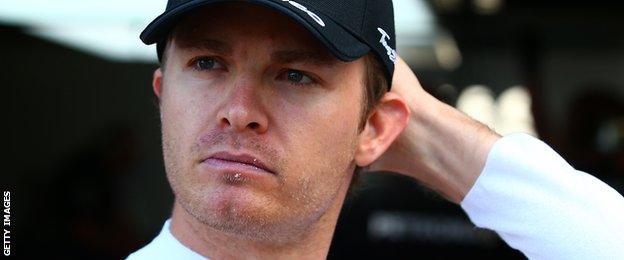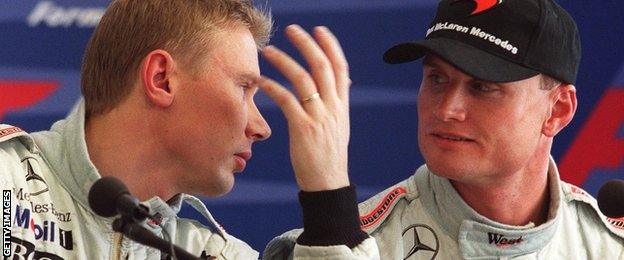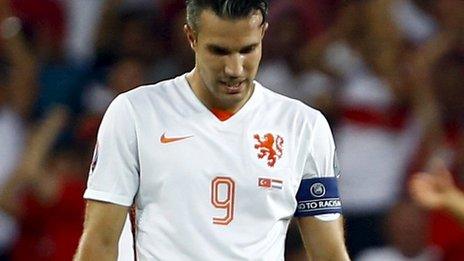David Coulthard column: Lewis Hamilton at top of his form
- Published
Lewis Hamilton produced a textbook weekend in Formula 1 domination at the Italian Grand Prix., external
Of course, he needs to be in the right car to execute that - as you can see from the woes of Fernando Alonso and Jenson Button at McLaren - but part of the skill of F1, beyond getting into it and staying there, is making the right decisions at the right time.
Hamilton's current position is the result of what appeared at the time to be his unthinkable decision to leave McLaren at the end of 2012 and join Mercedes.
That move represented a step-change in his life. He had been nurtured as a racing driver from the age of 11 by McLaren. His father had managed his career up until that point, and had been ever-present.
But in joining Mercedes at that time Hamilton left both those situations behind.
He made that decision having been persuaded by current non-executive chairman Niki Lauda and then-team principal Ross Brawn that it was the best place for him to be in the future.
How right they have proven to be.
Hamilton critics are missing the point

Hamilton has said he has "zero cares" if people criticise his personal life
Hamilton still has doubters out there - whenever I use a phrase such as a "Senna-esque performance" about Hamilton, I get criticised, as if it is some kind of sacrilege.
But Senna-esque is exactly how Hamilton is performing at the moment.
We cannot ignore the fact that Hamilton's team-mate Nico Rosberg has had a very solid career in F1, with the occasional exceptional race.
Rosberg gave Hamilton a run for his money in both their first two seasons as team-mates in 2013 and 2014.
Hamilton, like all great drivers, has exceptional speed. Rosberg appeared somehow to be able to neutralise that last year and the year before. But not this year.
The other day, I met a guy who was haranguing me about how ridiculous he thought Hamilton's tattoos were.
Now, tattoos are not my cup of tea, but if Hamilton likes them - or wants to dye his hair blond, or hang out with pop stars - who are we to judge?
As long as it is not affecting his driving - and it is abundantly clear that it is not, unless it is positively - then he should get on and do whatever he wants.
He is young, he is wealthy, he is at the top of his form, he has a great car. He will be feeling brilliant in himself, and that is reflecting in his performances on the race track.
Rosberg falling short

Nico Rosberg retired from Sunday's Italian Grand Prix three laps from the finish
Hamilton's win at Monza has put him in a commanding 53-point lead in the championship over Rosberg, and the German is absolutely right to say that it will now be "very difficult" to beat Hamilton to the title.
It is never over until it is over - Hamilton could have a run of bad luck with accidents and reliability. You never know.
But if we are frank, at hardly any point this year has Rosberg looked a match for Hamilton.
I can completely relate to that situation, and see it with a clarity that Rosberg perhaps cannot.
Having raced for six years as team-mate to Mika Hakkinen, I know what it is to be alongside a driver who fundamentally is just that bit faster.

Mika Hakkinen (left) finished ahead of David Coulthard in the drivers' championship in four of the six seasons they were team-mates at McLaren
You are often left short by only a tenth of a second - but you are left short.
You don't give up, and say: "Oh, he's better than me." You keep digging deep, and keep thinking of ways to win. You keep believing. That is an inherent part of being a sportsman.
But Rosberg has not been the equal of Hamilton this year, and he knows that.
There is no shame in that. He has been a great racing driver, and a marvellous asset for Mercedes F1 but so far Hamilton has been the stronger.
The tyre controversy
There was a nervous wait for Mercedes and Hamilton after the race while the stewards decided what to do about one of his tyres being slightly below the minimum permitted pressure at a certain point before the start of the race.
Inevitably, there has been some cynicism and grumbling about the decision to take no further action, but I always prefer to wait until the governing body, the FIA, makes its decision before wading in with an opinion.
Tyre pressures are a very difficult thing to get an accurate handle on, simply because they fluctuate so much.
The issue in this case was that the teams had been given a time before the race that the pressures would be measured, at which point Hamilton's tyres were within the allowed parameters.
Measured again after this point, they were slightly too low. But if you don't have a precise set of parameters for measurement - or you measure something that can change as much as tyre pressures can due to external factors at a different time from when you agreed - I don't see how you punish someone in these circumstances.
This will be a work in progress. The FIA has taken a sensible approach to the numbers and there will be more clarity around this situation by the time of the next race in Singapore on 20 September.
Welcoming a wider tyre debate
It was fitting in some ways that the weekend would end with a tyre controversy.
From the debate about whether Pirelli had chosen to set the minimum pressures too high the start of the weekend, to the meeting between top drivers, Pirelli and the sport's leading bosses, tyres had been the centre of attention all the way through.
We touched in the last column on Pirelli's decision to accept the request to produce deliberately fast-degrading tyres, and the difficult position in which that puts them.
The drivers have for a long time not been happy about the way these current Pirellis behave and would like to race on tyres that were more durable, so they can push hard for much longer than they can at the moment.
So it is about time that F1's bosses sat down and discussed with the drivers whether the current philosophy they are pursuing is the right one - and I am pleased to see that is what they are going to do.
For too long, the drivers' views have been dismissed by those in charge of the sport, sometimes in quite a patronising way.
But why would you not listen to and value the opinions of the people who are actually racing the cars?
To me, more so than the fans, or the broadcasters, or the journalists, the drivers are the most relevant people to talk about this - and they are not as enthusiastic about the latest F1 cars as they were in the past.
That does not just apply to the likes of Fernando Alonso, Sebastian Vettel, Hamilton and Rosberg - who were the men dragged into the meeting with Pirelli and Ecclestone. It applies to the young drivers as well.
The important thing to say is that F1 needs to appeal to the audience, and much of the audience is well aware that the drivers right now are not happy.
If the parents are not taking their sons and daughters, they go and do something else, and it would not take many years for the audience to die off if the sport is too expensive, too inaccessible or not entertaining enough.
F1's ability to challenge the drivers more than it does now is central to that.
David Coulthard was talking to BBC Sport's Andrew Benson
- Published7 September 2015

- Published7 September 2015

- Published6 September 2015
- Published18 December 2015

- Published2 November 2018

- Published26 February 2019
